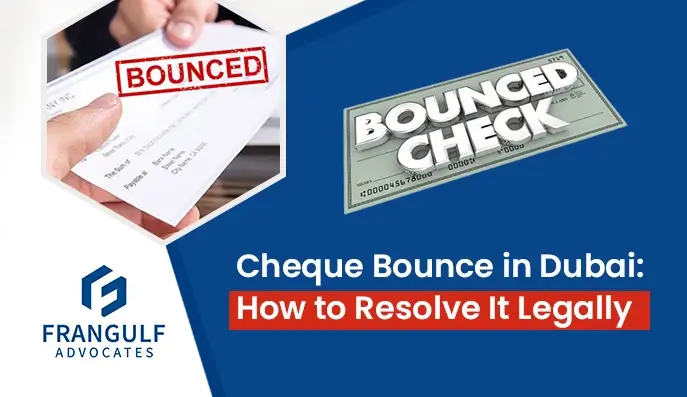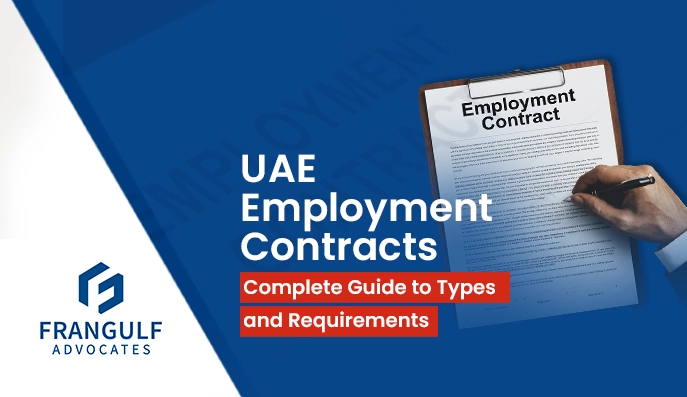How to Clear a Bounced Cheque in Dubai Legally

Table of Contents
- What Is a Bounced Cheque in the UAE?
- UAE Cheque Signing Laws and Legal Framework (Post-2022)
- Legal Consequences of Cheque Bounce
- Facing a bounced cheque case?
- How to Clear a Cheque Bounce Case: Step-by-Step Process
- Need help filing a civil case?
- Civil Court Proceedings for Cheque Bounce Legal Action
- Defense Strategies in Cheque Bounce Cases
- Accused of a bounced cheque?
- How to Prevent Cheque Bounce Cases
- When Should You Hire a Lawyer for a Cheque Bounce Case :
- Need Help with Bounced Cheque Issues?
- Conclusion
- Frequently Asked Questions
A bounced cheque in Dubai isn’t just a financial mishap, it can become a serious legal concern if not addressed promptly and properly. The UAE being a prominent financial hub, particularly for businesses and expatriates, still relies heavily on cheque transactions for various dealings, including real estate, salaries, contracts, and trade agreements.
The UAE government has progressively modernized its cheque regulations. Notably, the new cheque bounce law in UAE, enacted under Federal Decree-Law No. (14) of 2020 and effective from January 2022, aims to decrease criminal liability in most instances while strengthening civil accountability.
In this blog, Frangulf Advocates explains how to clear a cheque bounce case in Dubai, the current legal framework, civil procedures, and preventive steps to protect your financial credibility.
What Is a Bounced Cheque in the UAE?
In the UAE, a cheque is considered a legally binding financial instrument. Therefore, a bounced cheque is not merely a failed transaction but a legal liability, as it signifies a breach of financial obligation.
Common reasons a cheque may bounce include:
- Insufficient Funds: The most common cause. The account does not have enough balance to cover the cheque amount.
- Signature Mismatch: If the signature on the cheque doesn’t match bank records, it will be returned unpaid.
- Account Closed or Frozen: A cheque issued from a closed or inactive account cannot be cleared.
- Incorrect or Missing Details: Errors in date, amount in words and figures, or missing signature can invalidate a cheque.
- Stop-Payment Instructions: If the drawer instructs the bank to stop payment after issuance, the cheque may bounce, which could be interpreted as bad faith.
Pro Tip: Before issuing any cheque, always verify your account balance through your banking app or by calling your bank. Set up low-balance alerts to receive notifications when your account falls below the cheque amount- this simple step can prevent costly legal complications.
UAE Cheque Signing Laws and Legal Framework (Post-2022)
The UAE significantly reformed its cheque laws in 2022, shifting focus from criminalization to civil settlements and financial recovery. Previously, cheque bounce cases, even accidental defaults, often resulted in arrest due to their heavily criminalized nature. These modernizations aim to soften the legal repercussions associated with such incidents.
Key features of the new legal framework include:
- Decriminalization of Most Cheque Bounce Cases: Simple cases with no fraudulent intent are now addressed in civil courts.
- Criminal Charges Still Apply in Specific Cases: If a cheque is issued from a closed account, contains a forged signature, or is proven to be issued with fraudulent intent, criminal charges may still be pursued.
- Mandatory Accountability: The issuer must ensure funds are available at the time of issuance, with proper records to back the transaction.
- Banking Responsibilities: Account holders must ensure their accounts are active and able to process issued cheques. Any changes should be properly documented.
This legal update provided on the UAE Ministry of Justice portal encourages transparency and gives parties the ability to resolve issues without lengthy criminal trials.
Pro Tip: Keep all documentation related to every cheque you issue- including contracts, invoices, and correspondence. If a dispute arises, comprehensive documentation is your strongest defense and can distinguish between civil and criminal proceedings.
Legal Consequences of Cheque Bounce
While most cheque bounce cases are now civil matters, there are still consequences that can seriously impact your business or personal life. It is important to understand the scope of penalties to take timely action.
Types of legal implications you may face:
- Civil Penalties: These include a court order to pay the cheque amount, along with additional legal fees, penalties, and interest. Civil court judgments can also affect your credit and financial standing.
- Criminal Penalties: If the cheque was issued fraudulently or from a closed account, criminal action can be taken. This may include fines, arrest warrants, or travel restrictions.
- Travel Bans and Police Complaints: In unresolved cases, the payee can file a complaint that may trigger a police case and temporary travel ban until the matter is cleared.
- Federal vs. Local Application: Although UAE laws are federal, some procedural differences may exist across Emirates. Dubai courts are known for handling cheque disputes more efficiently.
Understanding whether your case falls under civil or criminal law is critical for determining the right course of action.
Facing a bounced cheque case?
Get immediate legal advice from our commercial law experts. We respond to urgent cases within 2 hours.

How to Clear a Cheque Bounce Case: Step-by-Step Process
When a cheque bounces, time is of the essence. Acting quickly and transparently can often prevent the situation from escalating to court.
1. Try to resolve the issue amicably
- Communicate with the Payee: Reach out immediately, acknowledge the issue, and offer a payment plan or timeline for clearing dues.
- Mediation Services: Dubai Courts and legal firms offer mediation services that help both parties reach mutually acceptable terms without the need for court proceedings.
- Written Agreements: If a payment plan is accepted, formalize it in writing to prevent future disputes.
2. Gather necessary legal documents
Before heading to court or mediation, prepare the following:
- The original bounced cheque and return memo from the bank
- Copies of any contracts, invoices, or agreements related to the cheque
- Email or message correspondence with the payee
- Emirates ID or business license copies
3. File a case in civil court (If required)
If the issue isn’t resolved privately:
- File a civil case at the appropriate Dubai court based on the cheque amount
- Consider the summary procedure, available for simpler cases with clear evidence
- Prepare for court hearings by organizing your documentation and evidence
Once judgment is delivered, the execution court ensures the payee receives the awarded amount.
Need help filing a civil case?
Our litigation team handles bounced cheque cases daily. Book your consultation now and protect your interests.

Civil Court Proceedings for Cheque Bounce Legal Action
Dubai’s judicial system has streamlined civil court processes, especially for financial disputes.
Important considerations when filing a civil lawsuit:
- Jurisdiction and Filing: File in a court based on the location of the incident and parties involved. Filing fees depend on the claim amount.
- Summary Proceedings: A fast-track option for cases with undisputed facts and complete documents. Ideal for simple, clear-cut cheque cases.
- Required Documents: Include all relevant transaction proof, the bounced cheque, bank correspondence, and identification documents.
During hearings, you’ll present evidence and may need to respond to the opposing party’s claims. If all documents are in order, these cases are typically resolved within a few months.
Defense Strategies in Cheque Bounce Cases
If you issued the cheque and believe the case is unjustified, a legal defense is an option. A strong defense could lead to reduced penalties or even a dismissal of the case.
Effective defenses may include:
- Invalid Transaction or Dispute: If the cheque was linked to a contract breach or undelivered goods/services, this could serve as a defense.
- Technical Errors: Mistakes in the cheque format (e.g., wrong date or figures) may invalidate it.
- Forgery or Unauthorized Use: Proving the cheque was issued or altered without your consent can absolve you from liability.
- Statute of Limitations: The claim must be filed within a legally defined timeframe (usually 3 years in UAE).
Professional legal representation is recommended for building a strong defense strategy.
Accused of a bounced cheque?
Contact our defense lawyers immediately. Every hour counts in building your case strategy.

How to Prevent Cheque Bounce Cases
Prevention remains your best strategy. By ensuring compliance and diligence in financial dealings, you can significantly reduce the risk of a cheque bounce case.
Preventive Measures Include:
- Maintain a buffer in your account: Always ensure your account has more than the cheque value to account for pending transactions or delays.
- Use Post-Dated cheques cautiously: Limit their use and document the purpose in a formal agreement.
- Avoid blank cheques: Never issue a cheque without filling in all the details clearly.
- Verify every cheque : Double-check dates, names, amounts, and your signature.
- Document everything: Keep records of all cheque-related agreements and transactions for future reference. For more banking best practices, visit the Central Bank of the UAE.
When Should You Hire a Lawyer for a Cheque Bounce Case :
For complex or high-value cheque bounce cases, especially those escalating to criminal charges, legal counsel is highly recommended. A lawyer can provide crucial assistance by:
- Drafting and reviewing repayment agreements.
- Representing you in mediation or court proceedings.
- Identifying the most effective legal defenses.
- Helping you avoid procedural errors that could worsen the case.
If you’re facing a cheque bounce case involving significant amounts or legal complexity, it’s advisable to consult a qualified corporate lawyer in Dubai who understands UAE commercial and financial regulations.
Need Help with Bounced Cheque Issues?
Facing a bounced cheque case? Don’t let it escalate. Our experienced team provides fast, effective solutions.

Conclusion
Resolving a cheque bounce case in Dubai demands a clear grasp of the current legal framework, a proactive stance, and frequently, expert advice. Due to recent legal reforms, the majority of these cases are now handled through civil proceedings, which are quicker and involve lighter penalties.
It is crucial to act swiftly, maintain open communication, and keep all financial records well-organized. Whether you are an individual, freelancer, or business owner, adhering to best practices and seeking consultation from specialists such as Frangulf Advocates can facilitate the smooth resolution or prevention of cheque-related disputes.
Frequently Asked Questions
What are common reasons for cheque bounce?
Main reasons include insufficient funds, signature mismatch, closed/frozen accounts, incorrect details (date, amount), and stop-payment instructions from the drawer.
What are the legal consequences of bounced cheques?
Consequences include civil penalties (payment + fees + interest), potential criminal charges for fraud, travel bans, and impact on credit standing depending on the case type.
What documents do I need to clear the case?
Required documents include original bounced cheque, bank return memo, related contracts/invoices, correspondence with payee, and Emirates ID or business license copies.
How can I prevent cheque bounce cases?
Maintain buffer funds, use post-dated cheques cautiously, avoid blank cheques, verify all details, and document all cheque-related agreements and transactions.
Facing a Legal Challenge? We’re Just One Call Away
Confidential, expert, and results-driven legal advice.






